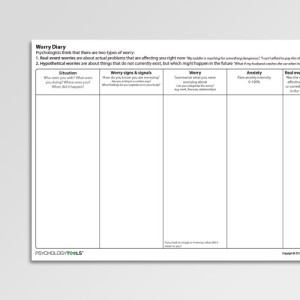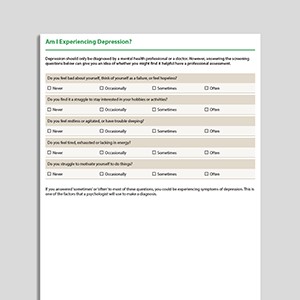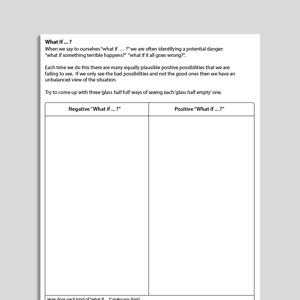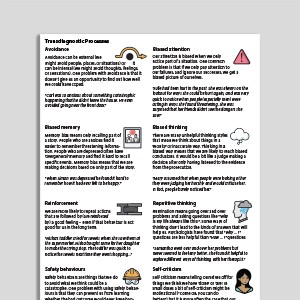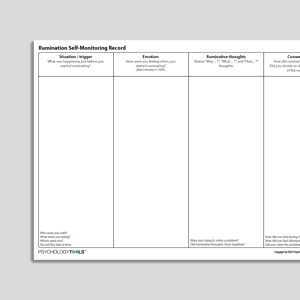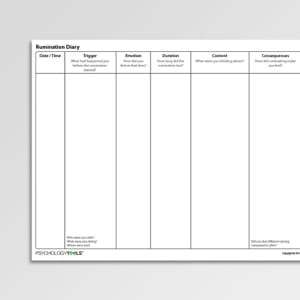Rumination
Human beings experience a wide variety of repetitive thoughts about themselves and their lives, not all of them negative. Reminiscing, savoring, anticipating, problem-solving, and emotional processing are positive examples of repetitive thinking, and go some way to explaining why we have the propensity to engage in repetitive thought. Some types of repetitive thought are unhelpful, though—even harmful. Rumination and worry are two key forms of unhelpful repetitive thought and use of these can predict anxiety and depression (Watkins, 2016). We can conceptualize repetitive thinking about the future as ‘worry,’ and repetitive thinking about the past as ‘rumination.’ They are maintenance factors in conditions such as generalized anxiety disorder and depression (Harvey et al, 2004). Read more
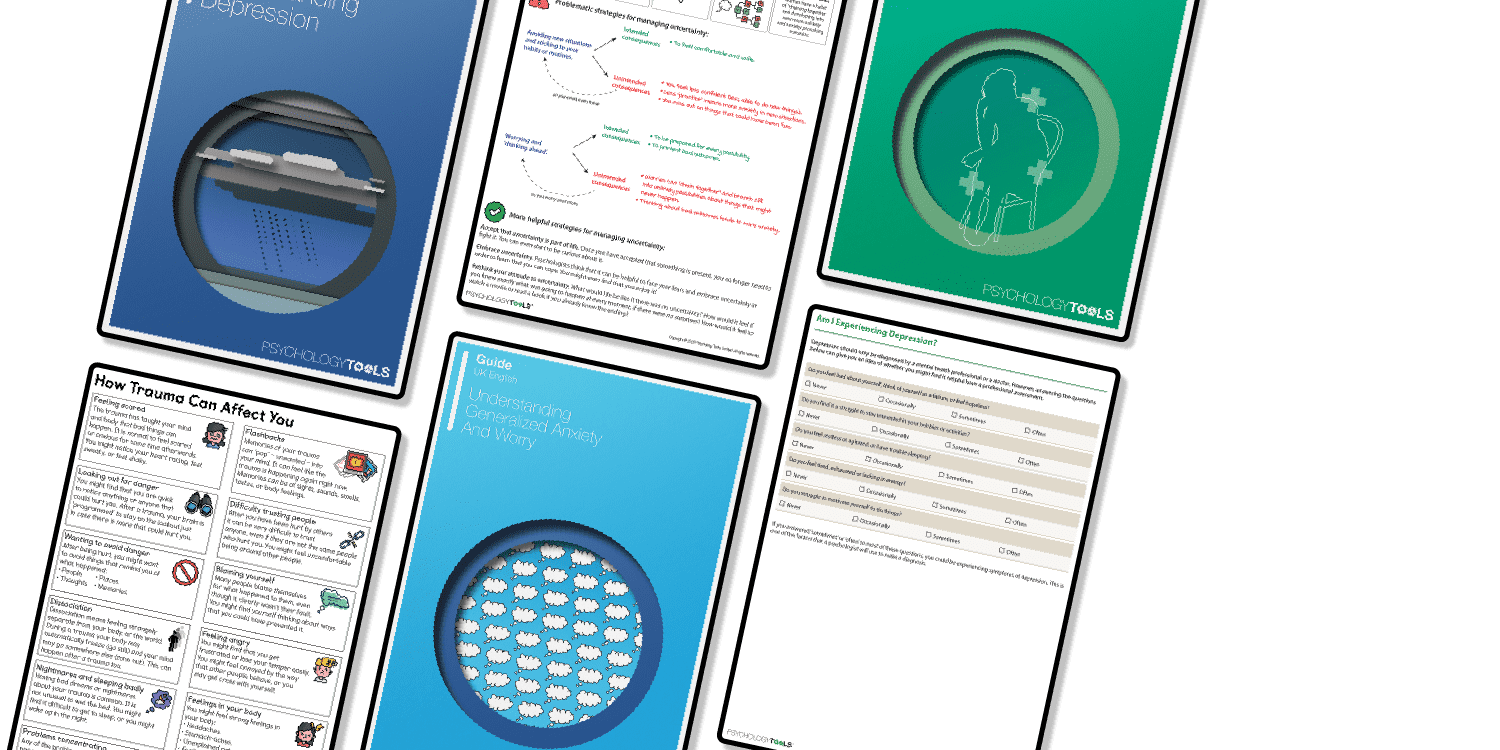
31 of 31 resources
Intolerance Of Uncertainty
Uncertainty is a normal part of life – we can never be 100% sure about what will happen next. Many people feel good about uncertainty and live lives ...
https://www.psychologytools.com/resource/intolerance-of-uncertainty
Before I Blame Myself And Feel Guilty
Guilt is a common post-traumatic reaction and is often the result of cognitive bias. This CBT worksheet explores common cognitive biases that have bee ...
https://www.psychologytools.com/resource/before-i-blame-myself-and-feel-guilty
Worry Flowchart
Worry is a cognitive process that involves thinking about problems that might happen in a way that causes anxiety. Not all worry is problematic – we ...
https://www.psychologytools.com/resource/worry-flowchart
How Trauma Can Affect You (CYP)
Trauma can result in a wide variety of symptoms, experiences, and behaviors. As well as post-traumatic stress disorder (PTSD), prevalence rates of oth ...
https://www.psychologytools.com/resource/how-trauma-can-affect-you-cyp
Worry Postponement
Worry postponement ("worry time") is often prescribed as an exploratory or standalone intervention relatively early in the treatment of GAD, but ...
https://www.psychologytools.com/resource/worry-postponement
Reactions To Trauma
Traumatic events are shocking and it is normal to feel overwhelmed. Not everybody reacts in the same way though and there is no ‘right’ way to res ...
https://www.psychologytools.com/resource/reactions-to-trauma
Understanding Generalized Anxiety And Worry
Our ‘Understanding…’ series is a collection of psychoeducation guides for common mental health conditions. Friendly and explanatory, they are co ...
https://www.psychologytools.com/resource/understanding-generalized-anxiety-and-worry
What Keeps Depression Going?
The “What Keeps It Going?” series is a set of one-page diagrams explaining how common mental health conditions are maintained. Friendly and concis ...
https://www.psychologytools.com/resource/what-keeps-depression-going
What Is Rumination?
Rumination and repetitive thought is a transdiagnostic maintenance process underpinning a range of difficulties. This information sheet explores the c ...
https://www.psychologytools.com/resource/what-is-rumination
What Is Worry?
Worrying is a form of thinking about the future, defined as thinking about future events in a way that leaves you feeling anxious or apprehensive. Cli ...
https://www.psychologytools.com/resource/what-is-worry
Understanding Depression
Our ‘Understanding…’ series is a collection of psychoeducation guides for common mental health conditions. Friendly and explanatory, they are co ...
https://www.psychologytools.com/resource/understanding-depression
Thought Record – Courtroom Trial
Thought records are commonly used in CBT to help people to evaluate their negative automatic thoughts for accuracy and bias. The Thought Record – Co ...
https://www.psychologytools.com/resource/thought-record-courtroom-trial
Worry Thought Record
Anxiety stems from negative predictions about the future (and also from assumptions that one will not be able to cope with the magnitude of the threat ...
https://www.psychologytools.com/resource/worry-thought-record
Understanding Health Anxiety
Our ‘Understanding…’ series is a collection of psychoeducation guides for common mental health conditions. Friendly and explanatory, they are co ...
https://www.psychologytools.com/resource/understanding-health-anxiety
Thought Suppression And Intrusive Thoughts
Suppression is a common approach to unwanted thoughts, worriers, doubts, or urges. Unfortunately, there are good reasons why this strategy fails. This ...
https://www.psychologytools.com/resource/thought-suppression-and-intrusive-thoughts
Cognitive Behavioral Model Of Generalized Anxiety Disorder (GAD: Dugas, Gagnon, Ladouceur, Freeston, 1998)
Individuals with generalized anxiety disorder (GAD) report significant worry which they find difficult to control and experience as distressing. Numer ...
https://www.psychologytools.com/resource/cognitive-behavioral-model-of-generalized-anxiety-disorder-gad-dugas-gagnon-ladouceur-freeston-1998
Self-Monitoring Record (Universal)
Developing self-monitoring skills teaches clients to systematically observe and record specific targets such as their own thoughts, body feelings, emo ...
https://www.psychologytools.com/resource/self-monitoring-record-universal
Catching Your Thoughts (CYP)
Before thoughts can be examined or challenged they must be ‘caught’ – they must be noticed and distinguished from events and feelings. The Catch ...
https://www.psychologytools.com/resource/catching-your-thoughts-cyp
Stages Of Social Anxiety
The Stages Of Social Anxiety worksheet is a tool to record unhelpful socially anxious responses to social situations, and to map alternative ways of t ...
https://www.psychologytools.com/resource/stages-of-social-anxiety
Rumination - Self-Monitoring Record
Developing self-monitoring skills teaches clients to systematically observe and record specific targets such as their own thoughts, body feelings, emo ...
https://www.psychologytools.com/resource/rumination-self-monitoring-record
Problem Solving (CYP)
Effective problem solving is an essential life skill and this Problem Solving worksheet is designed to guide children and adolescents through steps wh ...
https://www.psychologytools.com/resource/problem-solving-cyp
Court Trial Thought Challenging Record (Archived)
NOTE: An improved version of this resource is available here: Thought Record - Courtroom Trial. Older versions of a resource may be archived in the ev ...
https://www.psychologytools.com/resource/court-trial-thought-challenging-record
Process Focused Case Formulation
The Process-Focused Case Formulation encourages clinicians to make hypotheses regarding mechanisms or processes which they believe may be maintainin ...
https://www.psychologytools.com/resource/process-focused-case-formulation
[Free Guide] Living With Worry And Anxiety Amidst Global Uncertainty
This free guide was published in March 2020 in response to the coronavirus pandemic and is designed for anyone experiencing anxiety or worry. In times ...
https://www.psychologytools.com/resource/living-with-worry-and-anxiety-amidst-global-uncertainty
Worry Diary (Archived)
NOTE: An improved version of this resource is available here: Worry – Self-Monitoring Record. Older versions of a resource may be archived in t ...
https://www.psychologytools.com/resource/worry-diary-archived
Challenging Your Negative Thinking (Archived)
NOTE: An improved version of this resource is available here: Evaluating Unhelpful Automatic Thoughts. Older versions of a resource may be archived in ...
https://www.psychologytools.com/resource/challenging-your-negative-thinking
Am I Experiencing Depression?
Depression is a condition characterized by an extended period of low mood, anhedonia, and reduction in activity. Am I Experiencing Depression? is an i ...
https://www.psychologytools.com/resource/am-i-experiencing-depression
What If
"What if...?" questions are a powerful way in which anxious individuals generate or maintain anxious states, particularly in generalized anxiety disor ...
https://www.psychologytools.com/resource/what-if
Transdiagnostic Processes
A ‘transdiagnostic process’ is the label given to a mechanism which is present across disorders and which is either a risk or maintaining factor f ...
https://www.psychologytools.com/resource/transdiagnostic-processes
Rumination Self-Monitoring Record (Archived)
NOTE: An improved version of this resource is available here: Rumination Self-Monitoring Record. Older versions of a resource may be archived in the e ...
https://www.psychologytools.com/resource/rumination-self-monitoring-record-archived
Rumination Diary (Archived)
NOTE: An improved version of this resource is available here: Rumination – Self-Monitoring Record. Older versions of a resource may be archived ...
https://www.psychologytools.com/resource/rumination-diary-archived
Links to external resources
Psychology Tools makes every effort to check external links and review their content. However, we are not responsible for the quality or content of external links and cannot guarantee that these links will work all of the time.
Assessment
-
Ruminative responses scale
| Treynor, Gonzalez, Nolen-Hoeksema | 2003
- Scale
Guides and workbooks
- Dealing with worry in low intensity CBT | Chellingsworth, Farrand, Rayson | 2013
Information Handouts
- 11 Steps To Stop Ruminating | Jay Uhdinger
Information (Professional)
- Get out of the TRAP and back on TRAC (for rumination and worry) | GoodMedicine
Presentations
- The how and why of rumination and worry | Watkins | 2012
- Targeting rumination by changing processing style: experiential and Imagery exercises | Watkins | 2011
- Unwanted intrusive thoughts | David Clark | 2019
Video
- Stopping spam from going bad | Blake Stobie | 2016
- Concreteness training for rumination | Ed Watkins
Worksheets
- Ruminating thought worksheet: What to do when thoughts are unhelpful
Recommended Reading
- Watkins, E. R. (2008). Constructive and unconstructive repetitive thought. Psychological Bulletin, 134(2), 163-206
- Watkins, E. R. (2009). Depressive Rumination and Co-Morbidity: Evidence for Brooding as a Transdiagnostic Process. Journal of Rational-Emotive Cognitive Behaviour Therapy, 27, 160-175
- Watkins, E. R. (2016). Rumination-focused cognitive-behavioral therapy for depression. Guilford Publications.
What Are Rumination And Worry?
Disorders That Are Associated with Rumination and Worry
- generalized anxiety disorder (GAD)
- depression
- social anxiety
- post-traumatic stress disorder (PTSD)
- pain
- eating disorders
- insomnia
- psychosis
Helpful Questions for Assessing Rumination and Worry
- How often do you find yourself ruminating or dwelling on your problems?
- When do you tend to do most of your worrying or ruminating?
- What are the consequences of ruminating and worrying for you? How does it make you feel?
- Are there any particular feelings that are warning signs that you might worry?
- What tends to stop your ruminating?
Treatment Approaches That Target Rumination and Worry
A variety of treatment approaches have been identified that target rumination and worry. These include:
- approaching uncomfortable thoughts and feelings rather than avoiding them;
- imaginal exposure to a ‘worry script’ or ‘worry story’;
- problem-solving training;
- processing information at a more concrete and less abstract level;
- identifying and challenging positive and negative metacognitive beliefs that may contribute to repetitive thinking.
References
- Harvey, A. G., Watkins, E., Mansell, W., & Shafran, R. (2004). Cognitive behavioural processes across psychological disorders: A transdiagnostic approach to research and treatment. New York: Oxford University Press.
- Watkins, E. R. (2016). Rumination-focused cognitive-behavioral therapy for depression. New York: Guilford Press.
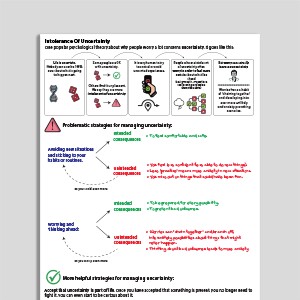
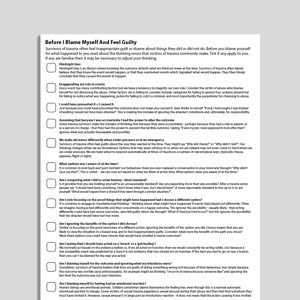
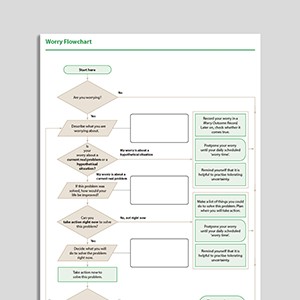
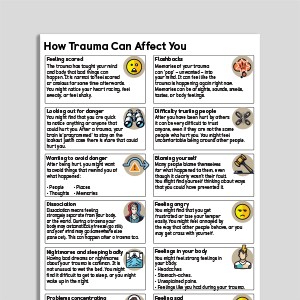
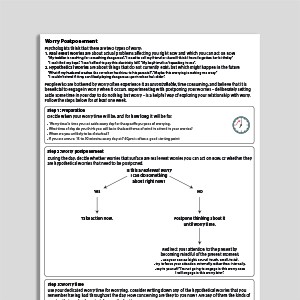
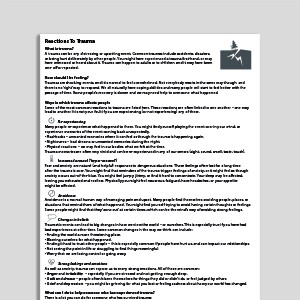

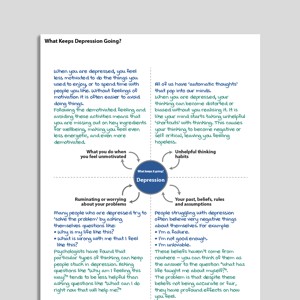
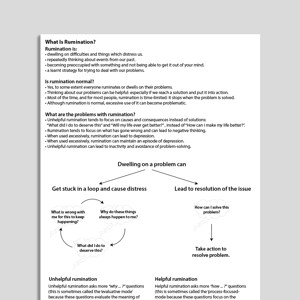
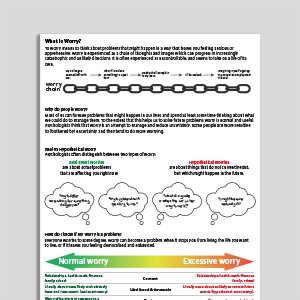
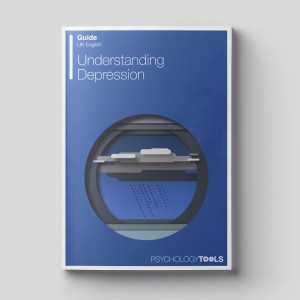
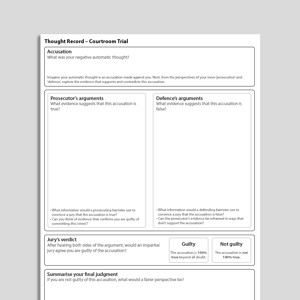
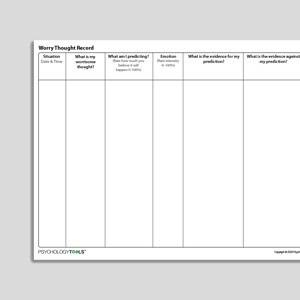
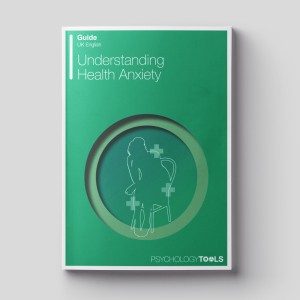

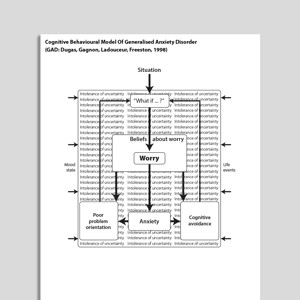
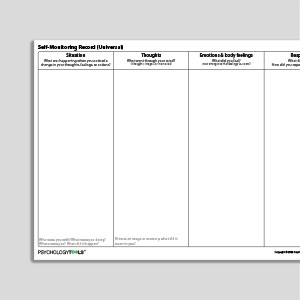
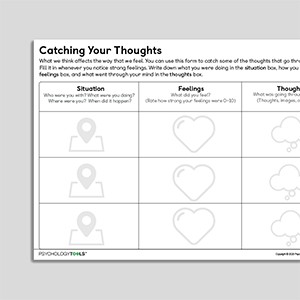
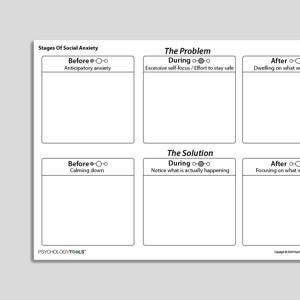
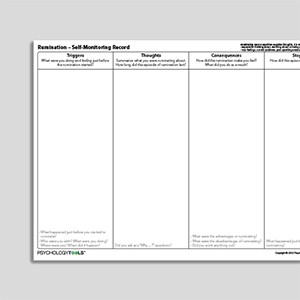
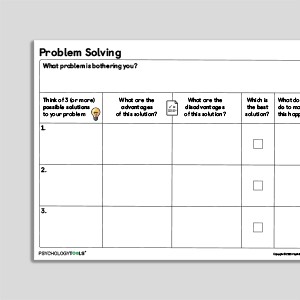
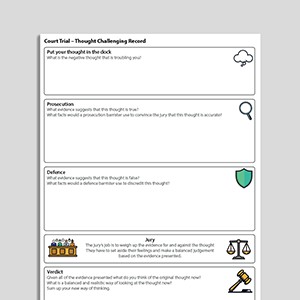
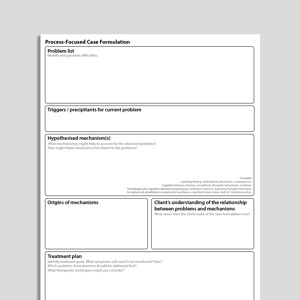
![[Free Guide] Living With Worry And Anxiety Amidst Global Uncertainty](jpg/_-guide_to_living_with_worry_and_anxiety_amidst_global_uncertainty_en-gb_guides_cover-preview.jpg)
